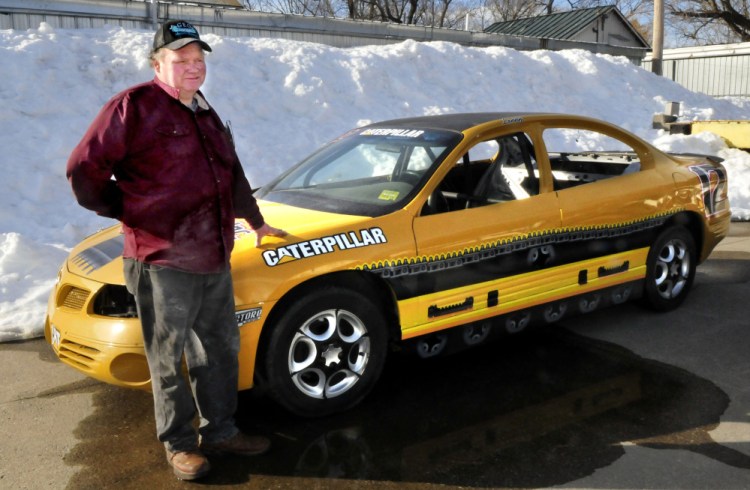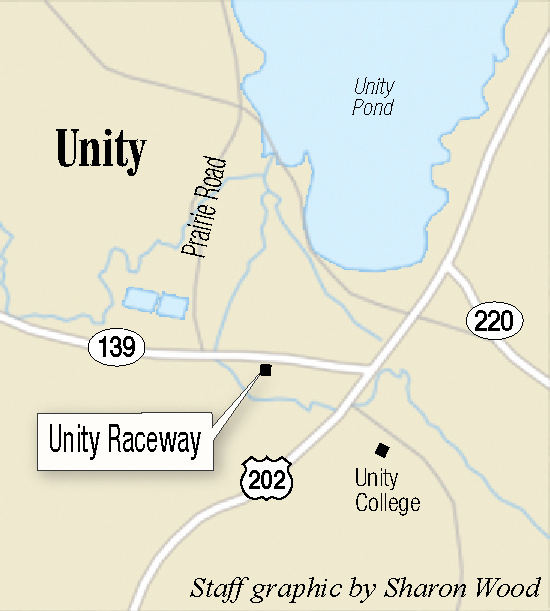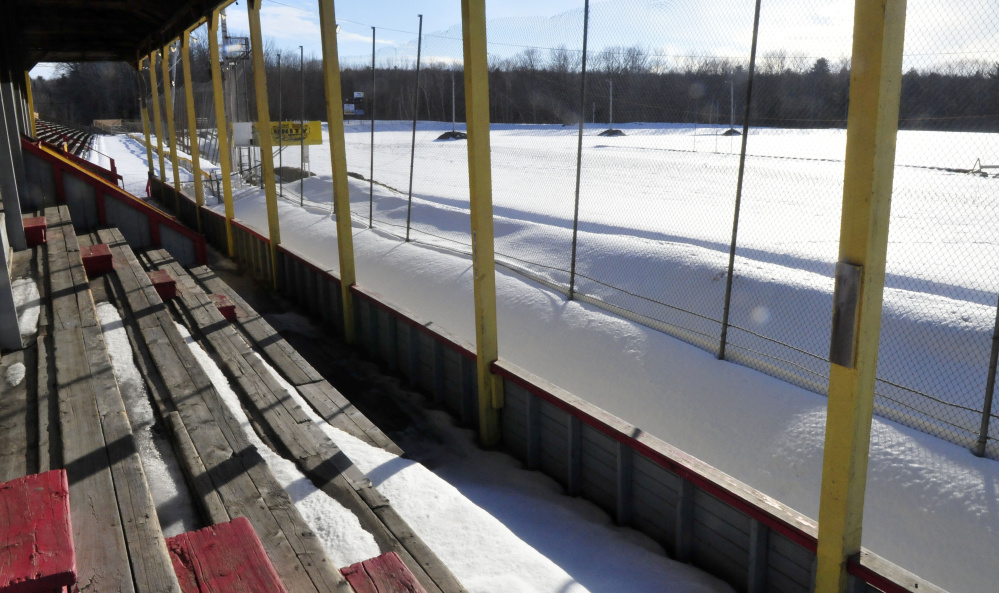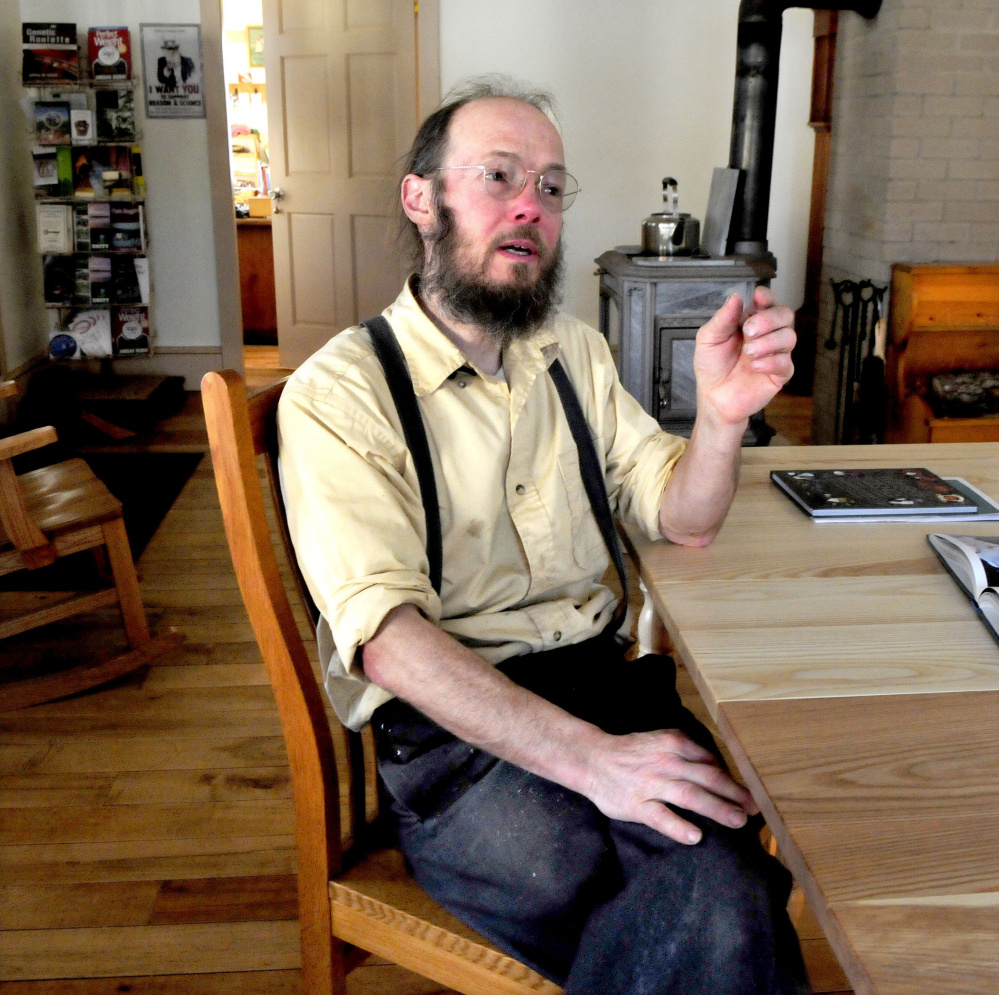UNITY — The first show of the year at Unity Raceway will open at 11 a.m. on Sunday, March 5, under the new ownership of George and Sherry Fernald, who plan to make a few changes to the more than 150-year-old racetrack that they bought from Ralph Nason in 2016.
But while Fernald hopes to revive the raceway as a center of community for the town of Unity, some people say it is noisy and no longer matches the vision of what Unity is today.
One of those critics is Ken Copp, a local furniture maker who owns Locust Grove Woodworks and is formerly Amish but still lives an Amish-like lifestyle.
“It’s the antithesis to the vision and the majority of the town,” Copp said of the raceway.
But Mary Leaming, chairwoman of the Economic Development Committee, said she thinks the unique blend of interests and diverse generations in town is part of what makes Unity great.
“Some of the things that have put Unity on the map are organizations like (the Maine Organic Farmers and Gardeners Association) and Unity College, and at the same time what used to put Unity on the map was the raceway,” Leaming said. “I think there’s something very neat about having a community that has a diverse drawing of attractions.”
The opening race on March 5 will feature a “new class” for racing in Maine, George Fernald said: Any two-wheel drive, American-made, four-door car is eligible to race.
“What we wanted was a cheap class to race,” he said. “There’s all kinds of these cars, and they’re cheap to get.”
To fix up a car like an Impala or a Buick for a race would cost around $1,000 if you did it yourself, he said. Each car will have to have a number and a theme so kids can pick their favorites.
This first race will also be on 5 to 6 inches of snow, he said, which he hopes to make an annual event.
“It’s just something different, something to break up the winter,” he said.
Fernald, 53, of Benton, started racing back in 1981, he said.
“I raced over 30 years myself there,” he said. “I just love the place.”
RACEWAY’S PAST, FUTURE
The Stevens Trotting Park was built in 1865 by Edwin Shellitoe Stevens, according to an article Unity Historical Society President and Unity College communications professor Patricia Clark wrote for the Lost Trotting Park’s Heritage Center.
The park was used for horse racing during the North Waldo Agricultural Society’s fairs, and a Unity Park Association was formed in 1875, it says. The grandstand and an exhibit hall were built in 1891, though the grandstand burned down in 1926 and had to be rebuilt. Sometime in the 1900s the fairs were discontinued, and the property was sold to the American Legion, which sold the property to Ed Knowles in 1948.
Knowles turned the property into a car raceway that featured a midway, Ferris wheel and carnival games, according to the article.
Ralph Nason, who owned the track for more than 35 years, said Knowles sold the property to his son, Bob Knowles, who ran it for a number of years before he opened an X-ray printing company and became too busy. When the track was closed for a season, Nason, a racer at the time, asked Knowles why he had closed it and started talking with him about taking over.
Nason bought the raceway in 1980 and opened that fall. He remembers the great names of car racing who came to Unity. Among the NASCAR and Winston Cup stars were Bobby Allison and Richard Petty.
He also remembers the annual fireworks display, which Fernald said he plans to continue.
“That was a home run,” Nason said. “Then I started this thing called the ‘long john.'”
After other racetracks closed for the season, Nason would put on what he called the “long john” because that’s what people had to wear to stand the cold.
“I think it’s done a lot (for the community),” he said, adding how when the raceway was busy, other businesses in town were too. “The way we ran that in the past, and the way I’m sure George is going to run it, we made Unity Raceway and the town of Unity a destination.”
While Nason said he doesn’t know if Fernald can attract the same kind of business as before, he does think he has good ideas.
“Now there’s so many things out there looking for the entertainment dollar. He’s got to come up with a niche,” he said. “George is coming along with different classes. He’s going to be presenting stuff for kids. He’s going to do stuff where they can go there and be involved and not break the family bank.”
Fernald said he and his wife do have some changes in mind for the raceway.
This spring and summer season will be limited with shows only once per month on Sunday afternoon. The rest of the month, Fernald is going to be making repairs, which include a new fence, new restrooms and remodeled concession stands that will be separated and set up like storefronts. While the grandstands will remain bright yellow, some of the paint colors will likely change, he said.
He also hopes to set up a campground behind the raceway with about 15 or 20 lots so those coming to races can camp out or for the college to use.
The Fernalds plan to open up the track to more than just car races, too.
So far, Fernald is talking with an association of tractor pullers in Maine. He plans to build a track for the tractors to see which machine can pull the most the farthest, he said. He would also like to hold rodeo shows at the track.
Beyond shows, Fernald said he wants to bring the town fair back to the raceway.
“I don’t think we pay for the place with just racing,” he said. “I think we’ve got to do other things. Racing has changed a lot since the 1980s.”
A SUSTAINABLE UNITY
Once when Copp, the furniture maker, went into town with his horse on a Saturday, he was shocked by the noise coming from the raceway. He didn’t realize when the races were, he said, or how much noise they made. The noise shocked his horse, too. Copp could hardly keep it calm and stop it from bolting, he said.
“How can anybody live here in town with that racket going on?” he said. “I wouldn’t want to live in the town of Unity.”
Copp is formerly Amish, though he said he still lives much like the Amish because he believes in “living a sustainable lifestyle as much as possible.” For example, he drives a horse and buggy to local areas.
Beyond the noise, Copp doesn’t see how the raceway fits in with Unity’s message of sustainability.
While Copp said he has nothing morally against the raceway, he doesn’t see how an event that burns so much fossil fuel can work in a place like Unity, which is home to the United States’ “environmental college.”
“If it was horse racing, it would be different,” he said, adding that he also wouldn’t mind the track if it raced electric cars, but he knows he’s only one person in town.
Copp acknowledged that it will be hard to change the mind of Mainers who are die-hard racers to mesh more with those who would be considered “tree huggers.”
As far as the historic nature of the raceway is concerned, Copp said he doesn’t know if he believes that the raceway “put Unity on the map.”
Unity was known as a town of great farmers, he said, and Quaker Farm Road speaks to that.
Historical society President Clark said the raceway was what people thought of years ago when they thought of Unity, but now they may think of the college or MOFGA, the organic association.
A TOWN LANDMARK
The track has been used as a raceway since 1948, Fernald said, so it shouldn’t be a surprise to people that there are loud races going on.
Still, he may try to shorten shows in the 2018 season, when they plan to run them on Saturday nights. Shows used to start at 7 p.m. and could go for five hours, he said. But Fernald would also like to have bands come play at the track after the races end.
Economic development Chair Leaming has heard opposition from people in town who don’t like the noise, but she also understands that the raceway has a long history with the town.
She’s hoping the new ownership and energy the Fernalds bring to the raceway will be like a “revitalization” for the business.
“The Economic Development Committee is excited about businesses thriving that do in general fall in line with the values of Unity,” Leaming said.
The Nasons could have sold the track to a housing developer for a lot more money, Fernald said, but they wanted it to remain a race track, so they sold it to him.
Fernald hopes the raceway continues on, and his three sons, all racers, are already interested in running it.
“It’s a town landmark now,” he said. “As far as I’m concerned, it’s what put Unity on the map.”
Madeline St. Amour — 861-9239
mstamour@centralmaine.com
Twitter: @madelinestamour
Copy the Story LinkSend questions/comments to the editors.







Success. Please wait for the page to reload. If the page does not reload within 5 seconds, please refresh the page.
Enter your email and password to access comments.
Hi, to comment on stories you must . This profile is in addition to your subscription and website login.
Already have a commenting profile? .
Invalid username/password.
Please check your email to confirm and complete your registration.
Only subscribers are eligible to post comments. Please subscribe or login first for digital access. Here’s why.
Use the form below to reset your password. When you've submitted your account email, we will send an email with a reset code.